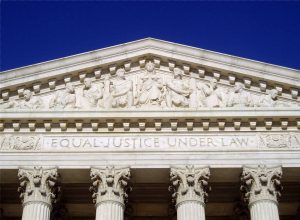The following opinion piece appears in the Milwaukee Journal Sentinel:
Our system of justice rests upon two pillars: equal treatment and independent judgment. Every person who appears before our state courts expects to be treated equally to every other litigant. In addition, every party to a lawsuit expects to have his case heard by a judge who is free to exercise their own independent judgment. Recently, the state legislature in Madison and Governor Walker approved legislation – a $3 billion package luring Foxconn Technology Group to build a flat-screen TV factory in Racine County — that seriously undermines these two fundamental principles.
The principle of equal treatment commands that the same rules should apply to all parties appearing before the court. No one should receive special status. It is true that the two sides in a case might not be evenly matched, and that one might have more financial resources or a more skilled legal team. But, even then, both parties in the case should be subject to the same set of laws and procedures, and have the same opportunity to argue that the law supports their claim.
The Foxconn legislation creates special treatment for Foxconn whenever that corporation is sued in Wisconsin courts. The law forces the Wisconsin Supreme Court to directly take appeals involving “Electronics and Information Technology Manufacturing Zones” (EITM) from the circuit courts. By law there is only one such zone, and that zone is home to Foxconn. Typically, the high court would hear appeals at their discretion, and then only after the case was heard by an intermediate court. The reason for placing cases involving Foxconn on a “fast-track” to the Wisconsin Supreme Court should be obvious. That Court currently boasts a majority of Justices who were elected with the financial support of Wisconsin’s largest trade and manufacturing lobbyists. The drafters of the legislation expect these Justices to be sympathetic to the concerns of manufacturers like Foxconn.
We expect our state court judges to be free to exercise their independent judgment when deciding the merits of a case. It is the trial judge that hears the facts and the evidence, and who determines the appropriate remedy should the plaintiff prevail. It is not the state legislature’s job to decide which party in a case should win, or what remedy should be imposed in an individual case.
However, the Foxconn legislation mandates that any ruling by a lower court that involves the EITM (and its sole beneficiary, Foxconn) must be automatically stayed while the fast-track appeal is pending. For example, if the trial judge hears the evidence and concludes that a violation of Wisconsin’s environmental protection laws is occurring, that judge would normally have the power to issue an injunction ordering Foxconn to immediately cease the challenged activity. The new law takes this remedy away from judges in cases involving Foxconn. If Foxconn is the defendant, a trial judge’s injunction would be automatically suspended, and Foxconn would be free to continue its conduct pending appeal. The trial judge can no longer order the remedy most appropriate to the facts.
In carving out special treatment for Foxconn, the Wisconsin legislature is encroaching on the powers of the judicial branch to advantage one corporation. In the past, states have offered tax breaks and cash incentives to businesses (this deal is the largest ever), but never before has any state modified its entire legal system in order to benefit a single company. This precedent inevitably will lead to other corporate employers demanding similar provisions. This legislation further tilts the already-skewed scales of justice in favor of corporate power at the expense of the average citizen.
Such blatant favoritism is unconstitutional. Persons suing Foxconn in court will likely argue that, by restricting the power of the judicial branch, the legislative branch is violating the separation of powers under the Wisconsin Constitution. In addition, future litigants will likely argue that the special procedures enjoyed by the opposing party in their case violates their right of due process under the U.S. Constitution.
The building that houses the U.S. Supreme Court famously features an inscription at its entrance reading “Equal Justice Under Law.” The elected officials who drafted and signed this unprecedented law have instead declared that, in Wisconsin, “Foxconn is More Equal” than any other party in our courts. The people of Wisconsin deserve better.


